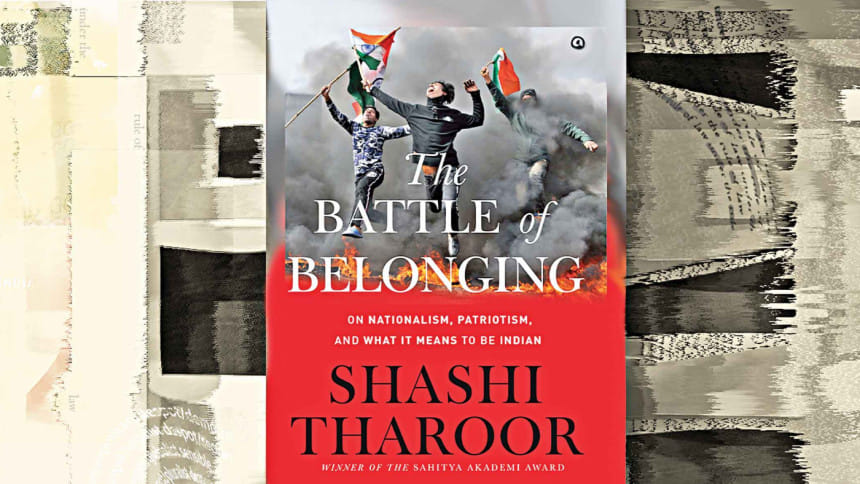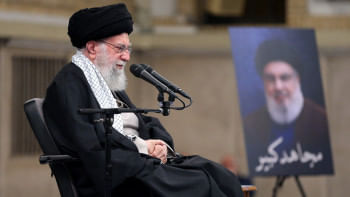Shashi Tharoor Looks Through A Glass Darkly, For Democracy

This is a must-read book for anyone worried about the vulnerability of democracy in our time and the rise of authoritarian governments everywhere. It is an apt reminder of the importance of democratic alternatives to totalitarian tendencies masquerading under populism. Surely, the dire consequences of tampering with democracy's fundamental principles should be disturbing anyone concerned even a bit about human civilisation. The phenomenon of Donald Trump, Vladimir Putin, Jair Bolsonaro, Viktor Orban, Recep Tayyip Erdogan—all "strong" men marring democracy—though depressing, is worth reflecting on.
In The Battle of Belonging: of Nationalism, Patriotism and What It Means to Be Indian (Aleph Book Company, 2020), Shashi Tharoor mentions these democracy-threatening leaders (he dubs them "oxymoronically" as constituting a "Nationalist international"), as well as ideal ones we can continue to seek guidance from, while ruminating about the state of democracy in his nation. As the inside cover flap informs us, he is (in his third term) "the longest serving member of the Lok Sabha" from his Kerala constituency, winner of India's Sahitya Akademi award, debater par excellence (watch him speak on YouTube at the Oxford Union debate, "Britain Does Owe India Reparations"), a former Under Secretary-General of the UN, and a State Minister in the last Congress government. The book under review is only the most recent of his other widely-read and thought-provoking titles.
Tharoor's is a learned and up-to- date work—it has 492 footnotes and a bibliography 25 pages long in addition to many in-text references to happenings only some months old at this time. He has read extensively and thought at length about the crisis imperiling democracy in his country. Seeing Trump-intoxicated demonstrators storm Capitol Hill, Tharoor would have surely linked CNN images of the rabid mob assaulting the citadel of American democracy to Indian media images of recent times— Kashmiris paralysed by the security "lockdown" and the communications "blackout" imposed on Jammu and Kashmir in 2019, or working-class Indians and immigrant labourers stranded everywhere after the Coronavirus lockdown enforced by India's central government in March 2020.
On the one hand, The Battle of Belonging is a paean to an India heir to "a rich and diverse and plural civilization". This is the India that Tagore, Gandhi, Ambedkar (three of Tharoor's heroes) and others envisaged in their different ways. This was an India that was a herald of parliamentary government, of "liberal constitutionalism", and a vibrant even if not always perfect postcolonial democracy, of democratic pluralism, and the kind of civic nationalism where diverse peoples of different origins, religions, languages, classes and castes kept overcoming all sorts of odds in their bid for integration. On the other hand, as far as Tharoor is concerned, is present-day India where democracy is being undermined by a majoritarian rule that has been taking advantage of democratic norms only to subvert them. He sees in his India today the nurturing of the cult of the strong man-ruler, "ethno-religious nationalism" in ferment, and people being cajoled for devious purposes through surreptitious use of new media channels.
Tharoor writes with passion, urgency, and learning. His 410 pages of text is in very readable and often eloquent prose; however, he wears his learning with ease and wit. He illustrates his concerns and his convictions with impressive writerly skills and telling examples from world history. He has, obviously, a phenomenal memory and a gift for apposite quotes. Most important, he writes about his country entirely as a patriot; as he tells us in his Prologue, although he has "spent a lifetime acquiring and embodying a cosmopolitan, even globalist, sensibility", his father had passed on to him "a passionate sense of belonging, not just to a physical country called India, but to the idea that it represented in the world." Tharoor's passion does make him insistent and repetitive at times, but he has a mission to persuade his Indian readers through this book. He absolves himself on this point with a sentence worth quoting—"As I never tire of pointing out, the fundamental DNA of India, then, is of one land embracing many."
And why should I, a Bangladeshi, value his book? Bangladeshi nationalism is central to my thinking, but I see it as part of a quartet, along with socialism, democracy, and secularism—all embodied in our 1972 constitution. From what I can deduce from his book, his vision of India is not dissimilar. Also, like Indians, Bangladeshis can lay claim to a heritage that has evolved out of "a shared history". Like him, we should be wary of, and vocal against, encroachments on basic human rights in our country every which way we can and articulate our concerns as best as we are able to from where we are. Finally, like him too, let us look forward to the optimal functioning of "pluralist democracy," operating "under the rule of law" in our beloved country.
The Battle of Belonging is available for sale at Bookworm Bangladesh.
Fakrul Alam is UGC Professor of English at the University of Dhaka.

 For all latest news, follow The Daily Star's Google News channel.
For all latest news, follow The Daily Star's Google News channel. 



Comments